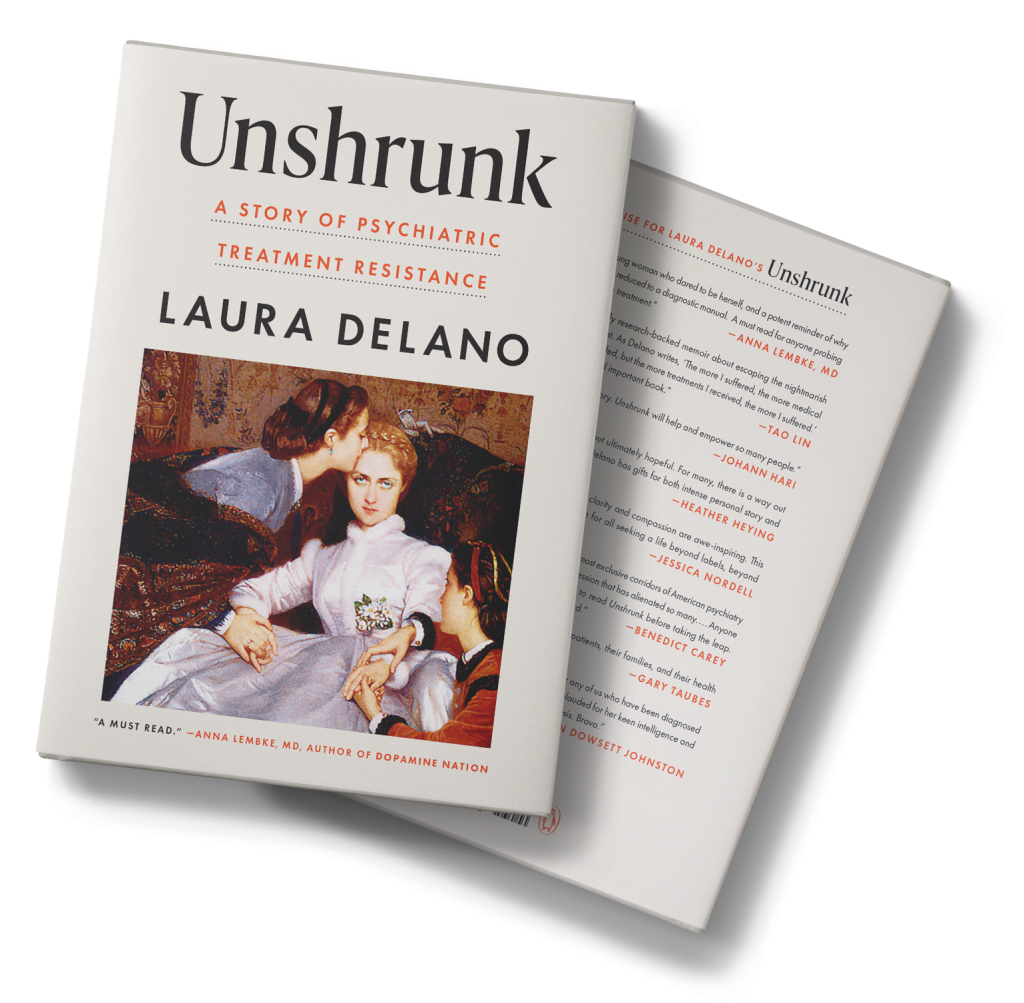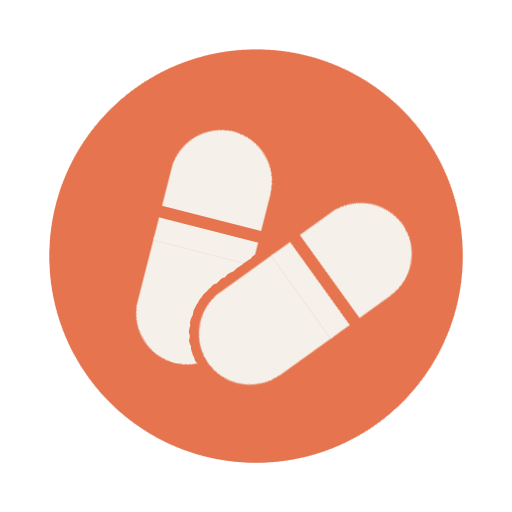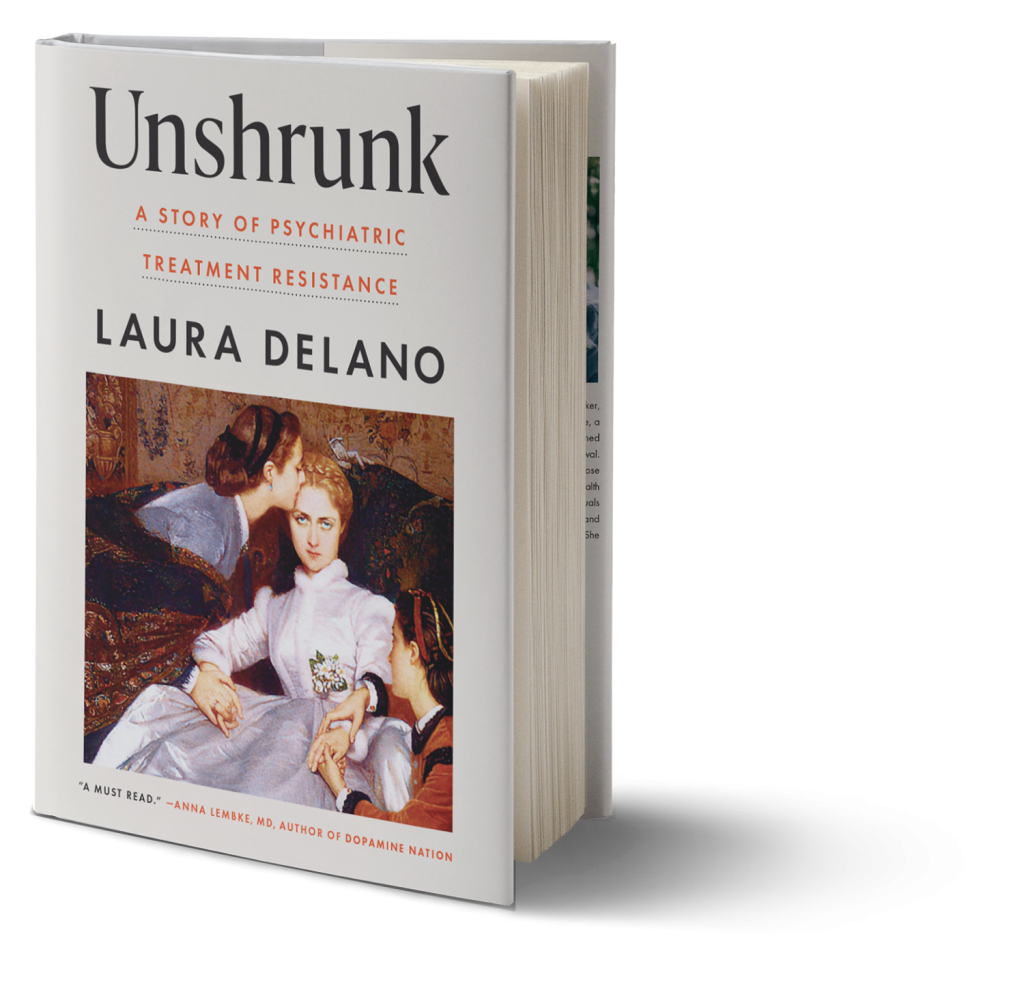
Shining a Light on America’s Mental Health Crisis
In her gripping memoir Unshrunk: A Story of Psychiatric Treatment Resistance, Laura Delano shares her harrowing journey through the mental health industry, offering a window into both her personal struggles and the broader societal issues affecting so many people today.


“The more I suffered, the more medical treatments I was convinced I needed, but the more treatments I received, the more I suffered.”

“A really moving and heart-rending story. Unshrunk will help and empower so many people.”
Johann Hari | New York Times bestselling author of Stolen Focus

“Unshrunk is a revelation—haunting, but ultimately hopeful. For many, there is a way out from behind the veil of mental illness. Delano has gifts for both intense personal story and deep analysis.”
Heather Heying | Author of A Hunter-Gatherer’s Guide to the 21st Century


Building a Life Beyond Labels
Discover what Laura’s 14-year relationship to doctors, therapists, diagnoses, and medications taught her about pain, living beyond psychiatric labels, and the way we make sense of what it means to be human.

“Unshrunk is the story of a young woman who dared to be herself, and a potent reminder of why human suffering can never be reduced to a diagnostic manual. A must read for anyone probing the dark side of mental health treatment.”
Anna Lembke, MD | New York Times bestselling author of Dopamine Nation

More Than Just One Woman’s Story
Unshrunk weaves together Laura’s intensely personal narrative with an eye opening analysis of the history of psychiatry and efficacy studies of many of the drugs she was prescribed.
Laura’s experiences echo those of countless others caught in a system that can often exacerbate the very problems it aims to treat.

…if the treatment I’d been turning to for half my life for help had in fact been harming me, it meant that my life never had to have unfolded in the way that it did. And now here I was, twenty-seven years old, all these years into a medicated existence. The damage had been done. There was no going back to do it differently.”

A Story for All of Us

We don’t have good evidence for the safety or effectiveness of long-term psychiatric drug use or polypharmacy.
Of the nearly 65 million American adults currently on psychiatric drugs[1], 80% have taken them for over three years [2] – yet the safety and effectiveness of these drugs is assessed by the FDA on the basis of trials that last, on average, 6-8 weeks[3]. There is zero evidence base for polypharmacy, yet many people are on multiple medications at once.

More Americans are suffering than ever before while psychiatric drugs are being prescribed at the highest rates in history.
Nearly 1 in 4 adults and 1 in 10 children in the U.S. take psychiatric drugs[5]. Between January 2016 and December 2022, the monthly antidepressant dispensing rate for children and young adults (up to 25 years old) increased 66.3%[6] and prescriptions for college students increased by 41.3% from 2015-2021.

Antidepressants, the most widely prescribed psychiatric medications in America, generally perform no better than a placebo.
In 2022 researchers analyzed data from 73,000+ participants across 232 trials and found that for most people, the difference between antidepressants and placebo was “very, very small, and in half the studies, non-existent,”[4] even among severely depressed patients.

“A powerful, inspiring, rigorously research-backed memoir about escaping the nightmarish trap of psychiatric drug treatment. I highly recommend this brave and important book.”
Tao Lin | author of Leave Society
A Story for You
Whether you’re questioning the stories you’ve been told about your struggles, working in a field that supports people through life’s challenges, or seeking a deeper understanding of what it means to be human beyond diagnoses, Unshrunk offers invaluable insights and inspiration.
- You, or a loved one, are
taking psychiatric
medication. - You’re a mental health
professional who cares
about your patients. - You care about
the future and well-being
of society.

Laura’s story illustrates the importance of making truly informed decisions about these medications. It’s okay to question the conventional psychiatric narrative that medication is the default answer for mental and emotional struggles.
There are many options beyond just accepting a psychiatric diagnosis and lifelong reliance on medication.

Laura’s story illustrates what can happen when people don’t have access to trustworthy, comprehensive information about the potential benefits and risks of psychiatric drugs in order to make truly informed decisions for themselves.
Quick to pathologize her teenage struggles and manage her symptoms through medication, her providers, though well-intentioned, missed an opportunity to help her explore the deeper existential questions and life challenges underlying her distress.

Laura’s story illustrates what can happen when meaningful adolescent struggles are reduced to symptoms needing life-long psychiatric treatment.
With more children medicated than ever before, it’s of the utmost importance that we step back to question the mental health system’s drug-based standard of care.

“Laura Delano’s Unshrunk is a revelation. Delano takes us by the hand and leads us into the depths of mental illness, the ways that modern psychiatric treatment can go awry and, most importantly, she illuminates a path back to mental health and hope for the future. This book is essential reading for patients, their families, and their health care providers.”
Gary Taubes | author of The Case Against Sugar
A Blend of Memoir, Research, & Cultural Criticism
Unshrunk is one woman’s raw, honest, personal story and broader critique of modern psychiatry, its drug-based paradigm, and our society’s quick-fix orientation to emotional pain.



About the Author
Laura Delano is a writer, speaker, and consultant, and the founder of Inner Compass Initiative, a non-profit dedicated to helping people make more informed choices about all things “mental health.” She is a leading voice in the international movement of people who’ve left behind the medicalized, professionalized mental health industry to build something different.
[1] Of the nearly 65 million American adults currently on psychiatric drugs…
40M in 2013: “16.7% (95% CI, 15.9%-17.5%) of 242 million US adults reported filling 1 or more prescriptions for psychiatric drugs in 2013”
“24% of Americans were taking psychiatric medications in 2022, according to the CDC” (population in 2022 was 333.3 Million = 79.9 M)
[2] 80% have taken them for over three years…
“Most psychiatric drug use reported by adults was long term” : 84.3% – in 2013 from a sample size of 36,940 in a study printed in 2017 in JAMA
[3] The average length of a psychiatric drug trial is only 6-8 weeks, even though people often take these medications for years.
Referenced in FDA documentation (footnotes 89-90).
89: Center for Drug Evaluation and Research, “Major Depressive Disorder: Developing Drugs for Treatment, Guidance for Industry,” draft guidance, June 2018
90: Center for Drug Evaluation and Research, “Improving the Design of Clinical Trials of Drugs to Treat Schizophrenia,” U.S. Food and Drug Administration, November 10, 2020
[4] Meta-analyses show the difference between antidepressants and placebo is “very, very small, and in half the studies, non-existent.”
In 2022 researchers analyzed data from 73,000+ participants across 232 trials (submitted to the FDA between 1972 and 2016) and found that “only a small percentage of participants experienced a response to the antidepressant that was significantly greater than the placebo response”
“Patients with depression are likely to improve substantially from acute treatment of their depression with drug or placebo. Although the mean effect of antidepressants is only a small improvement over placebo, the effect of active drug seems to increase the probability that any patient will benefit substantially from treatment by about 15%.”
“very, very small and medication in half the studies, non-existent,” even among severely depressed patients. Direct quote from Irving Kirsch, Associate Director of the Placebo Studies Program at Harvard Medical School, from a 2012 60 Minutes segment.
[5] Nearly 1 in 4 adults and 1 in 10 children in the U.S. take psychiatric drugs.
The statement is discussed in the book and supported by statistics from the Centers for Disease Control and Prevention (CDC) and the National Center for Health Statistics (NCHS). These sources indicate that 23.1% of U.S. adults were on psychiatric medications as of April-May 2022, and 8.2% of children aged five through seventeen were prescribed psychiatric medications in the past twelve months.
Reference in the Endnotes:
The references supporting this statement are found in the working notes and additional resources section:
Footnotes 337 and 290: These detail the sources used to compile the percentages, such as the CDC/NCHS Household Pulse Survey and the National Health Interview Survey, citing URLs like the CDC’s Household Pulse Survey and relevant NCHS Data Briefs.
[6] Between January 2016 and December 2022, the monthly antidepressant dispensing rate for children and young adults (up to 25 years old) increased 66.3%
This statement is accurate and can be found in a study published in Pediatrics in March 2024. The study analyzed over 221 million antidepressant prescriptions dispensed between 2016 and 2022 for adolescents and young adults aged 12 to 25 years, pg 248.
Primary , Secondary